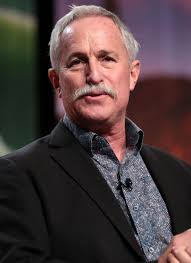Episode 30: Green Finance with Joel Makower (GreenBiz Group)
What if we took some of the trillions of dollars invested every year and put that money towards projects that address climate change and the UN Sustainable Development Goals? Well, green finance is trying to do just that. Learn in this episode about the various instruments and mechanisms that funnel more and more capital towards green projects. Plus, a special treat just for you! The man, the myth, the legend, Joel Makower, the Chairman and Executive Editor of "the" source for green business news, GreenBiz Group, joins us to talk green finance and (of course) his mustache. You can find more on green finance and all things sustainability at www.greenbiz.com.
Learn how more businesses are going green here!
Episode Intro Notes
What We'll Cover:
- What is Green Finance?
- Why is it important to advancing sustainable development and addressing climate change?
- What are the challenges to scaling green finance?
- How can listeners take part in green finance?
- About Joel Makower
What is Green Finance?
Green finance is an elusive term. One definition we saw is that it covers investments that generate environmental benefits as part of the broader strategy to achieve inclusive, resilient, and sustainable development (1). The main point is that it’s a broad term that includes all financial instruments and financing aimed at improving the environment and advancing sustainable development.
So with that broad definition in mind, here are some examples of things green finance could fund: infrastructure related to floods, erosion, and climate resilience; development of walkable cities; construction of public transportation; development of local food systems (vertical farming, urban and rooftop agriculture), etc.
We know what you're wondering: How do these projects get funded via green finance? Answer! With many types of instruments and investments:
Green Bonds
A green bond is a debt security that is issued to raise capital to support climate related or environmental projects. In other words, a green bond is when an entity, be it a business, municipality, or other organization receives money to fund some “green” project and promises to pay off that debt over time or at a certain date with a little interest. For example, in 2015 Seattle Sound Transit issued more than $900 million in green bonds to fund regional transit projects including more than 30 miles of light rail extensions (2). The issuance of “green bonds” has exploded since the first issuance in 2007, with $42 billion issued in 2015, and an expected issuance of more than $250 billion in 2018 (3). That means it’s almost grown by six times in just 3 years! While the green bond market is set to grow even further in the coming years, it right now is less than 1 percent of the total bond market.
Social Bonds
Social bonds are where the proceeds are used to finance projects with social objectives (4). One example is in March 2017, where National Australia Bank issued $400 million in bonds to support organizations designated as Employers of Choice for Gender Equality (5).
Sustainability Bonds
Sustainability bonds are where issuers use the proceeds for both environmental and social projects. In other words, it’s a hybrid of a green bond and a social bond. Starbucks recently issued more than $1 billion over two sustainability bonds, one in the US and one in Japan, that it used to purchase beans from farmers practicing its Coffee and Farmer Equity Standards, to support farmer support centers, and to finance smallholder loans at low interest rates (6).
SDG Bonds
The bank HSBC issued the world’s first Sustainable Development Goals-based bond in 2017. The proceeds of this bond will be used to support projects that advance seven selected SDG targets. These could include hospitals, schools, small-scale renewable power plants and public rail systems (7). The $1 billion offering was three times oversubscribed, meaning there was much more interest than was available to buy.
ESG Disclosure
Another example of green finance is the disclosure of environmental and social information to investors. France in 2015 became the first country to require climate change related reporting from a wide variety of actors including publicly traded companies, banks, and institutional investors like insurance companies and pension funds (8). Institutional investors with balance sheets above 500 million euros must report on their exposure to both physical climate impacts and to ‘transition risks’ – their exposure to the changes caused by the transition to a low-carbon economy. Learn more about sustainability disclosure in Episode 13.
Green Stock Indices and Exchanges
A stock index is a measurement of the value of a section of the stock market. The Dow Jones Sustainability Indices was launched all the way back in 1999. It now has global, regional, and industry-specific indexes. Selection criteria evolve and companies must make improvements to their long-term sustainability plans to remain on the index. For example, in 2017 Samsung was added while the natural gas company Enbridge was dropped. An exchange is a place to buy and sell securities. Luxembourg launched the world’s first green exchange in 2016, and it is restricted to bond issuers who dedicate 100% of the raised funding to green or social investments or a hybrid (9).
Green Banks
Green Banks are institutions dedicated to financing the deployment of renewable energy, energy efficiency, and green infrastructure projects in partnership with private lenders (10). In short, the goal of green banks is to facilitate the financing of clean energy projects. How they do this and the source of the funds vary. In other words, the green bank model is flexible.
For example, the first green bank in the United States, the Connecticut Green Bank, has several programs to expand access to clean energy in the state (11). It helps to offer zero-interest pre-development loans for multi-family property owners to analyze and acquire energy improvements such as weatherization and solar PV systems. Internationally, the Australian Clean Energy Finance Corporation is private-sector oriented and finances projects like the country’s largest utility-scale battery storage project (12).
Why is green finance important to addressing climate change and advancing sustainable development?
First, let’s talk climate change. All countries (ahem minus the US ahem) meeting each of their “Intended Nationally Determined Contributions” (INDCs) committed to at Paris will cost trillions of dollars. Some see this as a huge cost and drain on the economy. For example, fossil fuel companies argue this transition will mean trillions in stranded assets, meaning the coal and oil will stay underground and need to be recorded as a loss on balance sheets (13,14).
Others see this as an investment opportunity. For example, the International Finance Corporation found that just in certain emerging markets, between now and 2030, there is a $23 trillion investment opportunity in “climate-smart investment opportunities” (15). Note that $23 trillion is more than the value of all the companies traded on the New York Stock Exchange (16).
Ok, so trillions are needed to fight climate change. What about the 17 UN Sustainable Development Goals (SDGs) that 193 countries agreed to in 2015 to work towards achieving by 2030? They address a wide variety of issues including gender equality, ending hunger, and clean water and sanitation. The UN says achieving the SDGs will take between 5 to 7 trillion dollars annually (17), but one estimate says achieving the SDGs could open up $12 trillion in market opportunities.
Green finance can help us finance these ambitious and critical goals. Countries recognize the important role green finance can play. In 2016, the G20 Leaders agreed “it is necessary to scale up green financing” (18).
What are the Challenges to Scaling Green Finance?
- The difference in time horizons between the quick return investors are seeking and the long-term nature of environmental benefits (19).
- There is still a lack of clarity and standardization as to what qualifies as green finance. For example, should oil companies be allowed to issue green bonds? Should a university be able to issue a green bond to finance a parking garage that it says will mean more electric car charging stations and less cars burning gas looking for spots? By the way, those are real examples (20).
- Without clarity on what is green, there is the concern about green washing, which is when the action is not as beneficial as claimed and it is mainly done for PR purposes. There are voluntary standards such as the Green Bond Principles and the Climate Bonds Standard, but not all issuers choose to follow them. For more on green washing, check out Episode 28 on sustainability marketing.
- Financial institutions are not used to analyzing and quantifying environmental risks. However, they are quickly building up this capacity as they work to meet their green finance goals.
- Countries don’t have the policies or the tax incentives in place to encourage green financing. This is changing rapidly though as countries seek to capture the money flowing into green finance and to meet their Paris commitments. The United Nations Environment Programme in a 2016 survey found that 217 measures had been taken in 60 countries that explicitly focused on encouraging sustainable finance (21).
- Some businesses are skeptical of getting involved with a new kind of financial instrument. However, more businesses may turn to green finance as they think more seriously about their purpose and their environmental impact, thanks not only to society’s increasing focus on these issues but also their investors.
- Larry Fink, the CEO of Black Rock, which actively manages $1.7 trillion in assets (22), released a letter in early 2018 asking companies to demonstrate leadership on social issues such as climate change. His letter makes clear financial returns are not enough anymore and green finance can be a way to raise money to make the kind of impact people and investors are calling for.
How Can Listeners Take Part in Sustainable Finance?
Direct their investments to instruments focused on or limited to those that have a positive environmental impact. For example:
- Wunder Capital allows you to invest in solar projects with high targeted returns (23)
- The Redwood Mutual Fund from Aspiration is a mutual fund that is limited to companies that are both poised for growth and do well on environment, social, and governance (ESG) factors (24)
- Swell Investing is an online platform that makes it easy to invest in portfolios that represent baskets of publicly traded companies that will grow and positively impact certain trends. It has portfolios focused on zero waste, green tech, clean water, and others.
Some of these may have minimum contributions and involve needing to be an accredited investor, but if you want your money only going toward companies that share your environmental and social values, you can make it happen.
About Joel Makower
Joel is the godfather of sustainable business, writing and speaking for more than 30 years. When people want to know the truth and get a sense of the field, they turn to him. These days he writes articles for GreenBiz Group, of which he is chairman and executive editor. GreenBiz.com is the place to go for sustainable business news, and we frequently use it as a reference when writing our intros.
We could go on and on about Joel’s sustainability bona fides but here’s a cool fact. Joel is the author of an oral history of the Woodstock music festival that was published in 1989, republished in 2009, and that Rolling Stone magazine called “the definitive history of the mega concert.”
Sources Cited:
- https://www.huffingtonpost.com/nick-robins/2017-what-next-for-green_b_14203706.html
- https://www.soundtransit.org/About-Sound-Transit/News-and-events/News-releases/st-executes-world-s-largest-issuance-municipal
- https://www.forbes.com/sites/gauravsharma/2018/02/01/global-green-bond-issuance-set-to-eclipse-250b-in-2018/
- https://www.icmagroup.org/green-social-and-sustainability-bonds/social-bond-principles-sbp/
- https://www.euromoney.com/article/b14sxhkbb0047d/capital-markets-how-to-build-a-social-bond-market
- https://www.greenbiz.com/article/how-starbucks-brewed-stronger-sustainability-bond
- http://www.hsbc.com/news-and-insight/media-resources/media-releases/2017/hsbc-issues-worlds-first-corporate-sustainable-development
- http://www.g20-insights.org/policy_briefs/fostering-sustainable-global-growth-green-finance-role-g20/ and http://427mt.com/2017/01/16/impact-french-law-article-173/ and http://www.acclimatise.uk.com/2017/06/12/french-law-requiring-investors-to-disclose-climate-risks-comes-into-force/
- https://www.forbes.com/sites/dinamedland/2016/09/27/luxembourg-launches-worlds-first-green-stock-exchange-lgx-the-full-green-monty
- http://coalitionforgreencapital.com/whats-a-green-bank-html/
- https://www.nrdc.org/experts/yerina-mugica/ct-green-bank-strengthens-commitment-low-income-residents
- https://www.nrdc.org/experts/sarah-dougherty/australias-green-bank-charges-ahead-energy-storage
- https://www.bloomberg.com/news/articles/2017-03-20/paris-climate-accord-could-make-the-world-19-trillion-richer
- https://www.greenbiz.com/blog/2014/03/24/exxon-stranded-assets-and-new-math
- http://www.ifc.org/wps/wcm/connect/news_ext_content/ifc_external_corporate_site/news+and+events/news/new+ifc+report+points+to+%2423+trillion+of+climate-smart+investment+opportunities+in+emerging+markets+by+2030
- GreenBiz State of Green Business Report 2018
- http://unctad.org/en/PublicationsLibrary/wir2014_en.pdf
- http://unepinquiry.org/wp-content/uploads/2017/01/2016-09-04-g20-communique-en.pdf
- https://www.die-gdi.de/uploads/media/BP_23.2016.pdf
- Scott's ABA Article
- http://unepinquiry.org/wp-content/uploads/2016/09/The_Financial_System_We_Need_From_Momentum_to_Transformation.pdf.
- https://www.blackrock.com/corporate/en-us/investor-relations/larry-fink-ceo-letter?cid=twitter:larryslettertoceos::blackrock and https://www.forbes.com/sites/peterhorst/2018/01/16/blackrock-ceo-tells-companies-to-contribute-to-society-heres-where-to-start/#3a3557da971d
- https://www.wundercapital.com/
- https://funds.aspiration.com/redwood/
- https://www.swellinvesting.com/homepage




